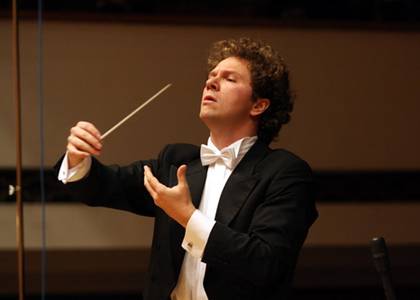> [Archived] Interviews

Martin Panteleev is the Conductor of the National Radio Orchestra
Pianist Dana Borșan will be, on Friday, 7th November, 2014, the soloist of the National Radio Orchestra and she will play the Piano Concerto No. 1 in B-flat minor, by Pyotr Ilyich Tchaikovsky; and, in the second part of the concert, the public is invited to listen to the Piano Concerto No. 2 in B-flat major, by Johannes Brahms. We are given further details about this evening’s programme in an interview granted by the conductor of the large symphonic ensemble of the National Radio Orchestra – Martin Panteleev.
This is your second
collaboration with the National Radio Orchestra. How is everything
going?
The orchestra has changed a lot for the past year from the point of view of how the members of the ensemble are interacting with one another. Tiberiu Soare's efforts can be sensed. As a conductor, you can sense a thing well done immediately. Last year I only met them, now we are continuing the dialogue we started with the last concert. It is a harmonious relationship.
From your point of view, what
is the characteristic of the Romanian musicians?
They are very interesting. They distinguish themselves by a unique sound – one which is situated on the borderland between the German school and the Slavic one. The collaboration with the Romanian musicians is always a special one; their interpretations change due to this aspect. This thing cheers me because I have conducted several orchestras playing the Symphony No. 2, by Brahms, but I feel a different kind of commitment, of emotion and more power with this orchestra. These features are needed when playing Brahms. I can hardly wait for this evening’s concert; I am curious about it.
You are interpreting
Tchaikovsky and Brahms this evening. Why did you choose the compositions of
these two composers?
It is a Romantic and a very well-known programme. Both works are among the most representative both for that creational period and these composers. I see it as a competition between Tchaikovsky and Brahms. It is true, there has always been like this in reference to these two composers. Tchaikovsky repeatedly said that Brahms' compositions were not sufficiently original. I do not agree with that assertion, especially when we are talking about the Symphony No.2, which is extremely descriptive. They are both composers I appreciate.
How do you feel about the dialogue with Dana
Borșan?
From my point of view, I think she detaches herself from the rest of the soloists who tackle this concerto. They all want to show off their technique, they all play at a very fast tempo. I appreciate her moderate vision, from the point of view of nuances, too, especially at the beginning of the concerto. I am sure her interpretation will be a very good one.
How did you start your
conducting career?
As a little boy I always wanted to conduct. When I was nine years old, I was playing in an orchestra and I was fascinated by the conductor; I was working a lot with Svilen Simeonov. I did not know for a very long time exactly what the designation of the conductor was. I understood it when I was sixteen and I started taking conducting lessons, and then, in college. When I was twenty-two years old, I received the first invitations to conduct an orchestra in Germany. Justus Franz gave me this chance; he knew me from the ensembles I had been a member of. We speak a lot about this profession even now. Concerts in Sofia, London and Berlin soon followed. It seems unbelievable to me; there are moments when I am on stage and I find myself asking if it is true what is happening. I have always wanted to be a conductor, I have believed I could do it and everything I do now feels like a dream come true. It is true that I put a lot of energy into it, but everything returns a hundredfold. Art fills a great part of our lives, but it also makes them better constantly.
You talked about your
relationship with Justus Frantz. Do you remember the first thing he told you?
I was the concert master in the orchestra he was conducting. We were preparing Carmina Burana and I dared suggest to him to try a different beat for a certain part of the score. He asked me to show the orchestra exactly what I wanted. He insisted and I ended up standing at the conducting desk, in front of a choir composed of 100 people and of a large orchestra; I conducted an excerpt from Carmina Burana and they responded to my suggestions. Justus Frantz then told those present there that I would never stop conducting.
Translated by Izabela–Elvira Vațe and Elena Daniela Radu
MTTLC, The University of Bucharest














